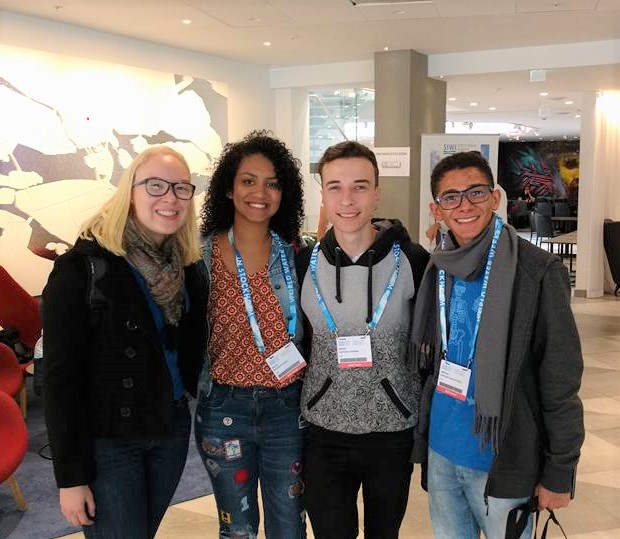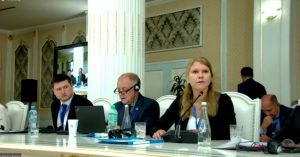How I became National Organiser!
I had no idea it would change my life.
Back in 2016, I was a member of the Brazilian National Youth Parliament for Water. Representing Rio de Janeiro, I was still figuring out what should a youth delegate do and what could be my specific role in that context.
At that moment, an opportunity emerged to participate at World Water Week. As part of the network strategy, I applied for Young Professionals free registration, but not for accommodation or travel expenses. Some weeks later, I had the great surprise of having been selected! “OMG, how will I get to Stockholm?”, I thought. That was when I started looking for sponsorship. Lots of hope and many calls resulted in nothing, but I still needed to find a way to get to Stockholm. I was at a crossroads: should I spend my recently received first wages on this trip?
I started searching on SIWI’s website… the WWWeek program, Prizes, Stockholm Junior Water Prize… ”Hmm, by Junior do they mean Youth? Maybe I can apply. Maybe they can pay my flight!!” was my immediate chain of thoughts. In a few minutes I realized that as a 23-year-old I was applicable for the SJWP competition anymore. I was a bit disappointed, but started to look at the previous winners of the Prize and realized that Brazil had not won the competition even once. Then I looked at the National Organizers (NOs) map on the website showing all countries participating in SJWP. And, Brazil was not there! How was it possible? The fifth biggest country in the world, where 12% of the world’s freshwater is marked by the Amazon river and the Iguaçú Falls, how could Brazil not be part of it? On the NOs page, there was a challenging question that made all the difference: “Do you have what it takes [to be a NO]? At the precise moment when I read the question, I answered to myself “Yes, going to Stockholm is worth the investment”.
I bought the tickets with my own money, contacted a friend of a friend for couch surfing, picked the warmest clothes someone from Rio may have and boarded to Sweden. I invested myself in the prize because I was completely cough by its ideal. Rushing from the airport, I arrived to the first event in the program for the Week, a dinner with the current NOs and finalists. I had the opportunity to chat with the brilliant young minds and grasp some advice from experienced NOs. But the brightest moment from that night was my conversation with Claire Reid, SJWP winner from 2003. Hearing her story, she made me realize that media coverage and hotspots should not be our main focus. The students and their project must be the focus of a NO’s efforts.
The week was amazing. Among other global youth, I was inspired by many people, from the High-Level Panels on Water to the coffee chats. I presented the idea of SJWP-Brazil to many people, hoping they could join me in this mission. Many loved the idea, smiled and gave me a pat on the back. Few actually came forward when the challenges came.
Of course, I knew there would be many challenges, the first being time management. I was working full time as an energy sector consultant and doing my MSc part time. Then I had to build a team, find sponsors, reach schools, select a jury, design an event, all multiplied by a continental country and varying time zones. However, after three years in this role, I am absolutely sure these challenges were difficult but necessary and rewarding. The tough challenges are related to people’s egos. No endeavor is “headache free”, nobody is naïve enough to think that. But in the non-for-profit world, and as it should be in all fields, trust is the base of all relationships. When your energy is sucked up by people who should be on your side but betray it, this is where you find the real challenges.
Another relevant topic, not only in my country, but worldwide, is the strength of institutions and the risks embedded in leadership transitions. Both in the private and public sector, when priorities are not well defined, or when decision makers are not aligned with the institutional mission, projects may suffer from discontinuity, especially the new ones. At the same time, in institutions with a long history and/or large capital, which may seem reliable, it still comes down to the people in charge to make all the difference. At the end, it is all about people, their passions, goals and how we align them towards a common and shared vision.
Returning back to the story of becoming a NO for the competition, SJWP taught me a lot. How do you treat a teenager who disappears from the hotel half an hour after arriving in Stockholm without a working smartphone? If you are a parent or a big sister yourself, you probably have a clue. If you are an only child, first time NO and your student has a big presentation in a language he barely knows the day after, it may take you some time to consider wisely your actions. When the first time you visit the presidential palace of your country to facilitate a meeting in which you are also a guest of honor due to your work at SJWP-Brazil, you may feel intimidated. When, in this same meeting, you have to disappoint someone who has been supportive to you, that is when you realize the consequences of making decisions. When a student you presented to the global water community (a national winner of SJWP) has to stop university in order to work to help his family, you may doubt the success of your mission.
Challenges, sure, but SJWP also gave me some of the most joyful moments of my life. Like the students representing Brazil our first year participating in SJWP, they made a tattoo with the symbol of their project after winning the national competition. I realized just how much their project and the SJWP competition really must have meant for them. To see the Brazilian flag carried for the first time in the presence of the Crown Princess Victoria of Sweden was also very touching. Additionally, among so many bad news, I could proudly watch my students conducting an interview to ONU News Portuguese, representing the first Lusophone country to take part at the SJWP. Not to mention the case of this one teacher who used the competition as inspiration to overcome a serious disease and motivate her students. Every time I hear the audio recordings, see the smiles or witness the hugs after presentations, I know this job is worth it.
These experiences have impacted me profoundly. The SJWP has exposed me to situations and opportunities that made me realize and aware of skills I have that I need to explore further. I found my passion for the international environment, the taste for representing my country, the soft skills required to deal with all sorts of people and public events. All this I found in myself through working as a National Organizer for SJWP. Thus, I have decided to start a new adventure, quite different from my engineering background. I am leaving Brazil to do a Master in Public Policy for the SDGs in a dual program in both Beijing/Geneva. Challenging, for sure, but thanks to the SJWP, I feel prepared.
In 2019, I am finishing my, for now, last cycle as NO for SJWP Brazil. Luckily, I can say I have received more than I have given. Beyond the life experiences, I made lifelong friends and mentors. People who have been on my side in the good and bad moments and that will continue to be there. People who trusted me over an e-mail. When the doors were closed and we had to start all over again, they had the patience to listen to me, give advice and join the hard work. When it was time to celebrate at the royal dinners, they were there to drink and dance as well. We planned events together and we cleaned the parties afterwards. They are family. This is SJWP for me.




